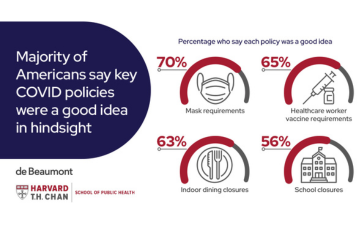In the latest 2020 “Fresh Perspectives” blog post presented by the de Beaumont Foundation, William Moore, a health educator who works in chronic disease prevention as well as in child and maternal health as a doula and lactation educator, describes what it means to be a birth worker during a pandemic. Moore, a graduate of Concordia University St. Paul and 2019 de Beaumont Foundation 40 Under 40 in Public Health honoree, has a consulting firm focusing on showing direct service providers how to include more men in the birth process to aid in the decline disparities as well as helping families successfully co-parent to ensure their children hit all their early childhood milestones. He was also recently named COO of Black Yoga Magazine, the only Black publication in the health and wellness industry.
Most people will tell you that what our society resembled before the pandemic wasn’t normal to begin with, so change was needed. But change still hasn’t happened for Black and brown people in health care.
Structural racism in our health care system has made the role of birth workers, who can support and advocate for Black and brown families expecting newborns, especially urgent.
I have been a doula and lactation educator in the Minneapolis-St. Paul community for three years. It’s always been important to have advocates in Black and brown communities because their members have faced the greatest disparities in education, income, health outcomes, and employment. When it comes to maternal and child health, Black women are dying from childbirth-related causes at a rate that’s 243% higher than white women. In my county specifically, Black babies are twice as likely to die before the age of 1 compared with white babies.
These pre-pandemic numbers were bad enough, but what happens when there’s no one in the delivery room to hold primary care providers accountable to improve the delivery experience of mom and baby, as well as their health outcomes? What do you think happens to the quality of care given to Black and brown families when room occupancy and attendance is reduced to a mother and partner, leaving out the birth worker and advocate?
What you get is unchecked and unmitigated negligence. What you get is doctors and nurses ignoring mothers’ pleas to thoroughly examine them during labor or postpartum because the pain they’re feeling — which they know is not normal — is seen as a non-issue. Myths like “Black lives don’t matter enough” and “Black women can handle more pain than other women” persist. What you get is doctors leaving mothers with no options and voiceless in how their experience should go.
Some of my colleagues have been prevented from staying with their clients during birthing, leaving them to wonder if their patients are able to activate the birth plans they’ve put together, gone over, and rehearsed for months. They’ve had to worry if their clients were being mistreated or if they were being properly attended to postpartum.
Some families have called me for consultations and asked whether getting a doula or midwife was worth the money because they wouldn’t be allowed to be with them in their moment of truth. I watched over FaceTime as a family was talked at and not talked to, the father was ignored, and the baby was taken from the room without informing the new parents what was happening.
Being a birth worker during COVID means imbuing more confidence and courage in mothers and their partners to speak up and advocate for themselves under insurmountable pressure from health care providers to just “follow directions,” standing firm in their expertise, matching wits with a doctor and health care system that may see them as less than human.
During this pandemic, being a birth worker means being prepared to advocate from afar and teaching your clients all that you know, as if you’re training them to be certified birth workers themselves.
My biggest fear is that the rates of maternal and infant mortality will increase during the pandemic without health care provider oversight, behind the closed doors of quarantine. But as birth workers, we can change these outcomes by continuing to champion the families we serve.
We can encourage and empower them to speak up for themselves even if it means sending written birth plans in the delivery room with them and imploring clients to call us when they feel uncertain. We can also come together by influencing policy so laws are protecting all families.
We need to ensure that health care providers are held accountable by keeping track of data such as not only births by demographic, but also publicizing and keeping record of complications and deaths if need be to let providers know these failures will not be tolerated or overlooked. This is a time for birth workers to advocate for our families as loudly and often as we can.
This blog post was first published on APHA’s Public Health Newswire.





